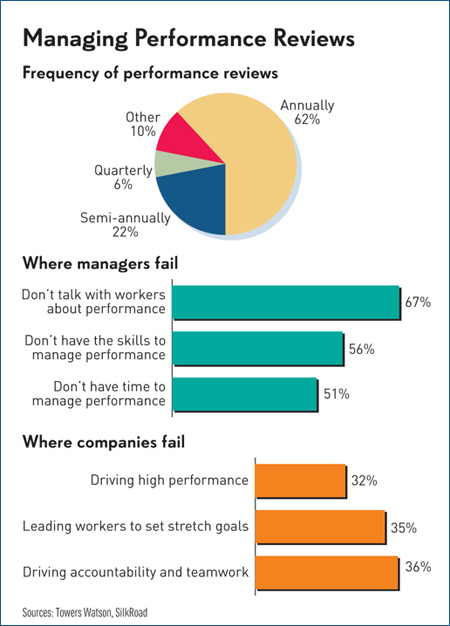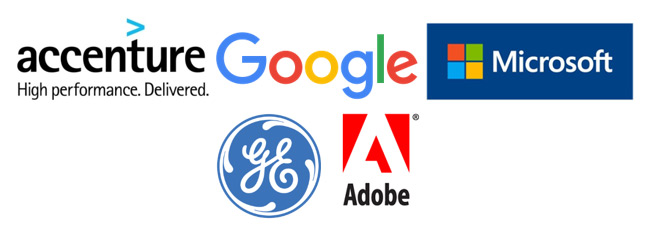MANAGING EMPLOYEE PERFORMANCE IMPROVEMENT
Are Annual Evaluations a Thing of the Past?
When David Russo headed up human resources for software maker SAS Institute, he earned employee cheers for a bonfire celebration that burned appraisal forms and ended annual reviews. Bloomberg Article
The decades-old annual icon of corporate culture, employee evaluations, is increasingly under fire from both evaluators and “evaluatees”. Typically delivered in the first months of the New Year, performance reviews prove to be universally stressful … and many critics describe the process as both demoralizing and ineffective as well.
In a Beckers Hospital Review article the Harvard Business Review (HBR) is referenced regarding forced or stack-ranking performance ratings more and more being replaced by performance reviews that emphasize ongoing, in-depth conversations between managers and their teams to constantly work on improving performance.
According to HBR, since 2011 the NeuroLeadership Institute has been studying the trend of companies ditching traditional performance ratings and pinpoints four main reasons for doing so.
- The nature of work has changed with more work being tackled by teams.
- Ranking systems inhibit much needed collaboration among employees by encouraging competitiveness.
- Performance rating interferes with recruitment and talent retention.
- Faster development is the result of frequent, candid conversations rather than a recap and rating of performance over the last 12 months.
Past generations of workers were more conditioned to accept a competitive, regimented workplace with rankings and top-down feedback once a year. That is no longer the case given the Millennials who now surpass Generation X as the largest group in the work fo
This is a generation that is wired for real-time, instantaneous communication and feedback … and that extends to their desires in the workplace. According to Forbes 79 percent of them want their boss to be a coach and mentor who help them improve, rather than someone who just measures their performance.
An Investors Business Daily article references a survey by Eagle Hill found that 49 percent of employees agree with the statement: “It’s a good idea to eliminate annual performance reviews and replace them with a system of regular feedback from supervisors.” That, coupled with the following survey by Towers Watson SilkRoad, underscores that not only is that desire ignored, management falls woefully short when it comes to communicating and managing workers performance.

Bottom-line is that annual performance reviews don’t work. There is a mountain of research from both business school professors and neuroscientists, supporting the conclusion that the practice is ineffective at boosting performance, actively alienates employees, and is often arbitrary and highly subjective. Additionally, the timeworn process most likely negatively affects employee engagement and productivity.
Managers then must perform as coaches with frequent one-on-one and team discussions regarding:
- What did we intend to accomplish?
- What did we accomplish?
- What might have caused the difference?
- What successes did we realize?
- What do we need to improve?
How adult is that?! Imagine having coaching sessions throughout the year that encourages a two-way dialogue in the spirit of attaining joint hospital and individual goals.
Then it is the managers’ job to makes sure everyone has the tools to make the identified improvement and boost performance. In that assessment, the manager needs to evaluate what is needed for each team member to make an improved contribution to the hospital.
The answers to the following questions are an excellent exercise to develop coaching context.
- What additional skill(s) does this person need to develop?
- What knowledge/training is needed to develop the needed skills?
- What change(s) in behavior does this person need to make?
- As manager, what steps will I take to close any gaps that will improve performance and add value to the hospital and patient care?
Here are just 5 of the many companies that are at the forefront of the move away from annual reviews.
Accenture: Managers emphasize timely feedback on assignments rather than focusing everything on a single annual meeting.
Google: Managers rate performance, but huddle with peer-level managers to solicit feedback to minimize subjectivity.
Microsoft: In lieu of an annual ranking system based on annual performance reviews, managers now give employees more frequent feed back on their performance.
General Electric: Managers place an emphasis on coaching with feedback geared to positive improvements in performance, not negative criticism.
Adobe: Managers now have shifted to frequent, informal conversations with their direct reports rather than an annual rate-ranking event.

Summary
In response to Management theorists who argue that they’re intimidating and promote bad management, more and more companies, including health care providers, are joining in a pioneering effort to replace the annual performance review. By emphasizing a once a year process to focus all goal setting and feedback discourages frequent conversations that truly improve performance. Absent the opportunity to course-correct as the year progresses, people end up blindsided by negative feedback at performance review time.
Be Well,
Al Strickler
Strickler Medical, Inc.
“Let’s do some business and let’s have some fun!”
